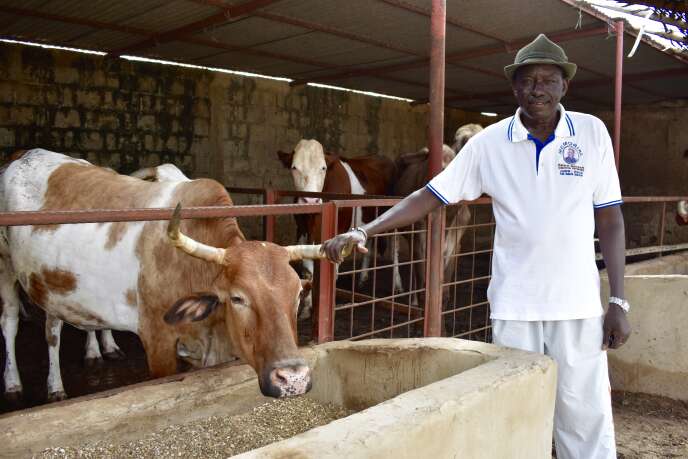 Les actualités de la BRVM en Flux RSS
Les actualités de la BRVM en Flux RSS
Nous agrégeons les sources d’informations financières spécifiques Régionales et Internationales. Info Générale, Economique, Marchés Forex-Comodities- Actions-Obligataires-Taux, Vieille règlementaire etc.
Enjoy a simplified experience
Find all the economic and financial information on our Orishas Direct application to download on Play StoreIn this rainy season, in mid-July, Michel Doudou Sène's ten cows graze all day in the once again verdant bush around Kaolack, 200 kilometers west of Dakar. But in the evening, at the barn, only a few will be milked. The Senegalese breeder is sorry: “We are limiting production because we are struggling to sell it. Customers prefer imported milk powder, which is cheaper and easier to find. To match the price of imports, Michel Doudou Sène had to lower the price per liter of milk from 700 to 500 CFA francs (from 1 euro to 75 cents). “However, our milk is of better quality! But it is also more expensive to produce”, he annoys, looking in despair at his three heifers about to give birth.
Read also France acts on the final restitution of works of art in Senegal and Benin
In Senegal, powdered milk represents 84% of milk imports, mainly from the European Union (EU). “Since 2018, our markets have been flooded with unprecedented stocks from the EU, which compete with our local milk,” summarizes Fatou Cheikh Ndione Sané, director of animal industries at the Ministry of Livestock.
A situation which risks being further amplified by the surplus stocks of European milk powder built up during the Covid-19 crisis, when demand for dairy products collapsed under the effect of confinements. These surpluses have every chance of being dumped in West Africa, at the risk of permanently weakening already fragile and poorly structured dairy sectors.

Michel Doudou Sène on his small farm in Kaolack, 200 km west of Dakar, July 16, 2020. Théa Ollivier
“We are concerned about the situation of breeders, and especially women who make up the majority of this sector,” warns Khar Ndiaye, program director at Oxfam Senegal. Imported milk, of low nutritional quality, is 30% cheaper than local milk thanks to subsidies from the European common agricultural policy, argues Ms. Ndiaye. Under these conditions, Senegalese producers can hardly resist the competition, already suffering from the low productivity of their cows, the high price of livestock feed and a complicated logistics circuit.
However, with 3.9 million cattle on the territory – of which 70% are females, half of which are of milk-producing age – Senegal has the capacity to be self-sufficient. One of the challenges is to be able to transport local milk from the production areas to the processing units and then to the points of sale. To achieve this, “we raise awareness of changing consumption habits,” explains Ms. Ndiaye.
In Kaolack, only a small artisanal processing dairy run by five women buys the production of breeders settled not far from the city. Dressed in pink, Awa Diallo shows the manual stainless steel machine that produces curds, cheeses or yogurts. On a shelf are lined up bottles of vanilla, banana or strawberry aroma. "My milk, I like it local", proclaims a slogan written in green letters at the entrance to the premises. "We are fighting against powdered milk to help our breeders," says Ms. Diallo, who herself is struggling to sell her dairy products, which customers consider too expensive.
The dairy sector will not be able to develop as long as the major processors do not incorporate or incorporate too little Senegalese raw material into their products. "Our milk does not interest the industrialists, based in Dakar and who do not travel to collect it", observes the breeder Michel Doudou Sène from Kaolack. And again, his exploitation is relatively accessible from the capital, compared to most breeders who are concentrated in the distant Fulani regions of the northeast of the country.
Protectionist measures
Only two Senegalese manufacturers make the effort to promote local milk. The Kirène group has set up a collection center in the Fatick region, in partnership with the Ministry of Livestock. But the pioneer company in this field is La Laiterie du Berger (LDB). Between 2007 and 2019, it went from 200,000 liters of milk collected to 1.1 million litres. Arona Diaw, secretary general of the LDB, admits that their products are "not very competitive" compared to powdered milk products. Result, “some are made with a mixture of local and imported milk, while waiting for the State to take more protectionist measures”, indicates Arona Diaw.
A first government decision relieved dairy players with the exemption from VAT on pasteurized milk produced in Senegal, which came into force in February 2019. But this is not enough to structure a resilient local dairy sector, analyzes Arona Diaw. A way to lower production costs could be the establishment of a subsidy scheme for energy prices, suggests Ms. Sané, at the Ministry of Livestock, assuring that “reflections are in progress”.
The various actors in the sector, supported by Oxfam, are above all asking for an increase in customs duties, currently 5%, on imports of powdered milk from the EU. This advocacy is carried out at the level of the Community of West African States (ECOWAS) to bring out a more competitive regional industry. The breeder Michel Doudou Sène dreams that "milk kiosks will be subsidized" installed in several places in the city of Kaolack, as is done in Dakar. Within reach of all consumers.
Vous devez être membre pour ajouter un commentaire.
Vous êtes déjà membre ?
Connectez-vous
Pas encore membre ?
Devenez membre gratuitement
22/04/2022 - Sociétés
21/04/2022 - Sociétés
20/04/2022 - Sociétés
20/04/2022 - Sociétés
20/04/2022 - Sociétés
20/04/2022 - Sociétés

22/04/2022 - Sociétés
